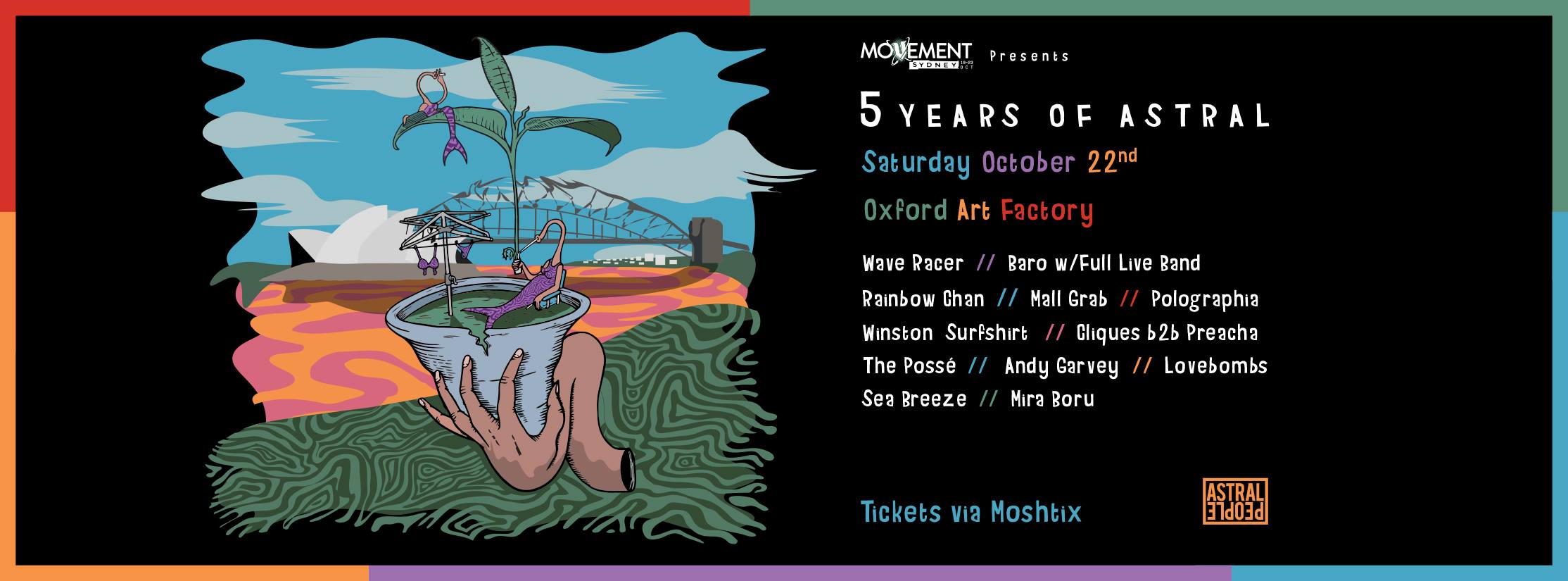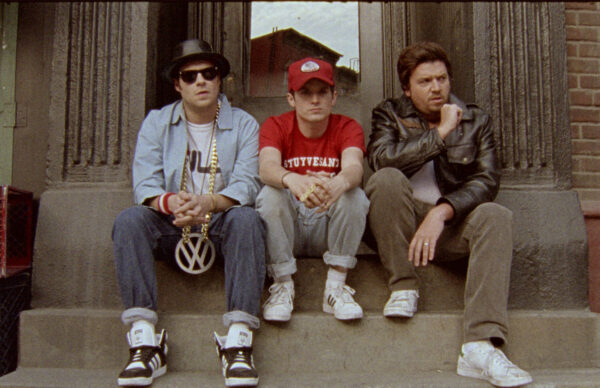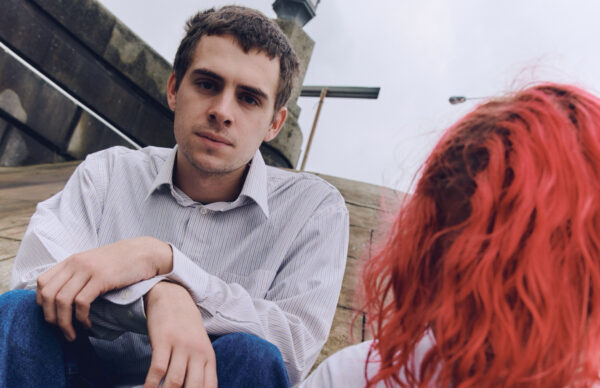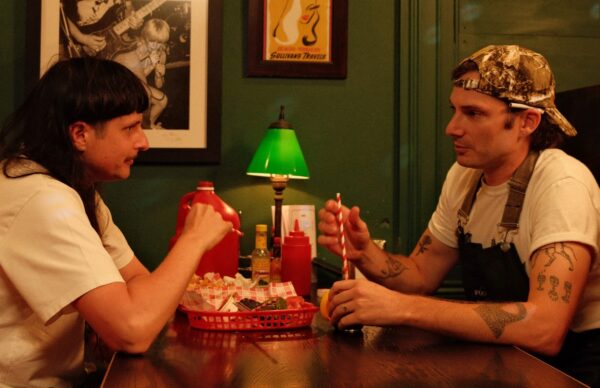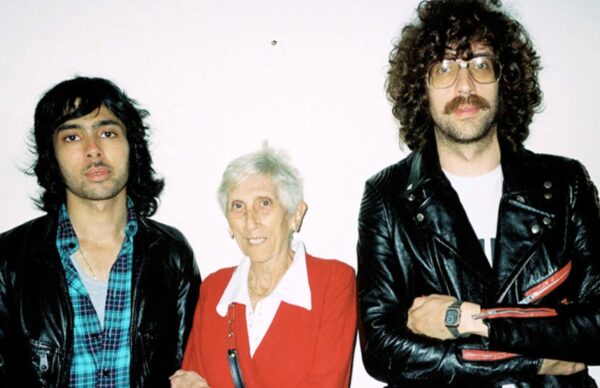Words by Christopher Kevin Au
When we sit down with Tom Huggett & Vic Edirisinghe – the brains behind the management and touring powerhouse known as Astral People – they’re on the brink of celebrating their fifth birthday. While the party pies and colourful confetti isn’t out just yet, it seems that the stars are now aligning in Astral’s favour more than ever.
Five years is a significant achievement given the cut-throat competitiveness and fiddly task of touring music acts Down Under, as well as the current climate where lockout laws are hindering local acts from having their voices heard in a live domain. Still, Astral People have continued to throw some of the country’s best parties and unforgettable experiences – whether that’s their Summer Dance series which sees international acts play sundown sets, to headline tours by everyone from DJ EZ to Yung Lean to Stormzy. Meanwhile, their management roster features Australian breakthrough producers like Basenji and upcoming vocalists like Rainbow Chan, proving to be a mixed bag in the most delightful sense.
It’s been a long journey for the lads, but it was clear from the get-go that this was a project worth investing time into. Combining their existing management clients in 2011, they curated a roster of acts and launched as a cohesive unit under the Astral People banner. “After a few meetings we threw our first party, and that was at Tone – it was full of acts from our management roster and very surprisingly, it sold out. It was a really big night and it showed us that there is a fanbase for this music and these acts in Sydney. For a couple of years we were working our of a really shit office in Rozelle, three desks side by side, all looking over each other,” Edirisinghe says.
“It was $50 a week rent, and we were working out of there three days a week on five hour days – we all had our own jobs and side hustles because we couldn’t make a full-time career out of it yet. We did that for another year, and then we started knuckling down abit harder. We started changing to four days and then we went full time from about mid-2012,” Huggett continues.
Able to enjoy the fruits of a more spacious office with air conditioning, Astral People flourished when acts like Flume rose to prominence, where younger audiences became accustomed to more off-kilter beats that strayed away from fistpump-inducing house and electro. Indeed, Flume even played an early evening set at Astral People’s first ever OutsideIn Festival at The Factory Theatre back in 2012 – worlds away from his current international stadium tours and closing sets at Splendour In The Grass. Still, despite all the hype about a so-called ‘Australian sound’ in the post-Flume environment, Astral People made diversity the cornerstone and driving ethos behind the brand.
“I think the reason we’ve been able to survive for as long as we have is because we never set out to promote one genre in particular. We never set out to be the big room house guys or underground techno guys or left-field beats guys. We listen to so many genres of music all the time. If you’re in this office, one minute you’re listening to Drake, the next minute an ambient album… It didn’t make any sense for us just to promote one thing. It obviously has to fit within a sphere, and that sphere can loosely be labeled as electronic music. Our international touring arm has grime to hip-hop to R&B to bands to house to techno, we literally do it all because we love it all,” Edirisinghe says.
This same mentality seems to have extended to larger festivals, too – Astral People are now working with Fuzzy on landmark dates including Listen Out and Field Day, while they’re also in a partnership with veterans Handsome Tours. “You look at festival lineups now, they’re so diverse to what they used to be. I remember that if it wasn’t a Big Day Out, every festival had one way of doing things. You look at a Fuzzy festival now, and you’ll see that rap is bigger than ever on that lineup – 10 years ago, that definitely wasn’t the case. Everyone’s taste is diversifying, it’s shown worldwide through a lot of different projects. Flume having Beck on a track and then Vince Staples on the same album, that never really used to happen – and if it did, it would be seen as a gimmick. Now it’s just the norm. Everybody wants to be involved in every scene,” Huggett says.
While more underground sounds are becoming embraced by the mainstream with greater warmth, business is booming – but also more competitive than ever. It seems like everybody wants a piece of the scene that Astral People have helped build, and as a result, Edirisinghe says that inter-personal relationships have become crucial in their everyday work dealings. “The loyalty that overseas agents and managers have is more important than ever before. There used to be this really big culture of Australian tour promoters really supporting one another… Back in the day, if a company toured an act first, then they would always get first dibs on that act. That agent and promoter in Australia would have that sort of loyalty to one another. Nowadays, because of the pure competition and huge amount of people doing it, that loyalty doesn’t exist to the same level that it once did.”
Edirisinghe further points to Snakehips as an example – a once niche dance act who are now collaborating with former One Direction members and getting heavy airplay on the likes of Nova 96.9. “We brought them out when they were playing to 200 people, and now they’re doing just about every festival you can imagine in Australia and they haven’t left us once. They could have easily done that, but why? We have a good relationship with their agent, their management and them. They know what big plan we’ve had for them, they know we’ve invested in them considerably for years and years, and they have faith that we’re doing our job properly,” he says.
Come October 22, Astral People will be celebrating their anniversary with a birthday blowout at Oxford Art Factory, with a sprawling lineup that includes longtime signees like Wave Racer, emerging emcees like Baro and his full live band, and even a former intern with Andy Garvey. It’s a family affair that’s sure to be a night to remember, and as the boys explain, it’s a particularly special time.
“It’s been a real breakthrough year, because all of these acts we’ve been with from day one – you work and work and work, and sometimes you just bang your head against the door and say ‘What’s going on? I’m just working but where’s the reward?’ And then you see everyone’s releases in the Top 10 iTunes charts, they’re selling out shows across the country, touring overseas and playing all the festivals – all this stuff is actually happening now, it just took five years,” Edirisinghe says.
“It feels a lot better when it’s not an overnight success – you know you’ve really earned it, you’ve been in the trenches with these artists for the past five years. The whole time from the beginning, you’re thinking if this is gonna work. You believe in it and five years later, everything starts making sense,” Huggett adds.
Five years on, it feels like Astral People have just begun a new chapter – and we’re sure that Australian dancefloors have plenty to look forward to.
